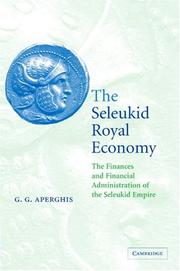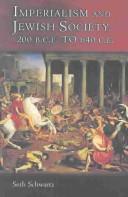| Listing 1 - 2 of 2 |
Sort by
|

ISBN: 0521837073 0521117763 1107161592 0511264895 0511265611 0511317344 0511482698 1280749652 0511263325 0511264135 9780511265617 9780511263323 9780511264139 9780511264894 9781280749650 9786610749652 6610749655 9780521837071 9780511482694 9780521117760 Year: 2004 Publisher: Cambridge New York Cambridge University Press
Abstract | Keywords | Export | Availability | Bookmark
 Loading...
Loading...Choose an application
- Reference Manager
- EndNote
- RefWorks (Direct export to RefWorks)
The Seleukid empire, the principal successor-state of the empire of Alexander the Great, endured for over 200 years and stretched, at its peak, from the Mediterranean to the borders of India. This book provides a wide-ranging study of the empire's economy and the methods used by the Seleukid kings to monetise and manage it so as to extract tribute, rent and taxes as efficiently as possible. It uses a variety of Greek literary sources and inscriptions, cuneiform texts, archaeological, numismatic and comparative evidence to explore in detail the manner of exploitation of their lands and subjects by the Seleukid kings, their city-building activity, the financing of their armies and administration, the use they made of coinage and their methods of financial management. The book adopts a highly original, numerical approach throughout, which leads to a quantified model of the economy of an ancient state.
Empire séleucie --- Seleucia --- Seleucid empire --- Seleuciden --- Seleucidenrijk --- Seleucides --- Seleucids --- Seleukeia --- Seleucids. --- Séleucides --- Syria --- Syrie --- History --- Economic conditions. --- Histoire --- Conditions économiques --- Séleucides --- Conditions économiques --- 333 B.C.-634 A.D. --- Economic conditions --- Economic policy --- Tax collection --- Taxation --- Finance [Public ] --- Arts and Humanities --- Middle East --- Arab countries

ISBN: 128208710X 9786612087103 1400824850 9781400824854 0691117810 9780691117812 9780691088501 0691088500 9780691117812 0691088500 6612087102 Year: 2009 Publisher: Princeton, NJ
Abstract | Keywords | Export | Availability | Bookmark
 Loading...
Loading...Choose an application
- Reference Manager
- EndNote
- RefWorks (Direct export to RefWorks)
This provocative new history of Palestinian Jewish society in antiquity marks the first comprehensive effort to gauge the effects of imperial domination on this people. Probing more than eight centuries of Persian, Greek, and Roman rule, Seth Schwartz reaches some startling conclusions--foremost among them that the Christianization of the Roman Empire generated the most fundamental features of medieval and modern Jewish life. Schwartz begins by arguing that the distinctiveness of Judaism in the Persian, Hellenistic, and early Roman periods was the product of generally prevailing imperial tolerance. From around 70 C.E. to the mid-fourth century, with failed revolts and the alluring cultural norms of the High Roman Empire, Judaism all but disintegrated. However, late in the Roman Empire, the Christianized state played a decisive role in ''re-Judaizing'' the Jews. The state gradually excluded them from society while supporting their leaders and recognizing their local communities. It was thus in Late Antiquity that the synagogue-centered community became prevalent among the Jews, that there re-emerged a distinctively Jewish art and literature--laying the foundations for Judaism as we know it today. Through masterful scholarship set in rich detail, this book challenges traditional views rooted in romantic notions about Jewish fortitude. Integrating material relics and literature while setting the Jews in their eastern Mediterranean context, it addresses the complex and varied consequences of imperialism on this vast period of Jewish history more ambitiously than ever before. Imperialism in Jewish Society will be widely read and much debated.
Jews --- Judaism --- Hellenistic Judaism --- Judaism, Hellenistic --- Civilization --- Greek influences. --- History --- Palestine --- Aelia Capitolina. --- Ancient Judaism (book). --- Archaeology. --- Avodah Zarah. --- Bar Kokhba revolt. --- Beit She'an. --- Book of Deuteronomy. --- Cambridge University Press. --- Capernaum. --- Cathedra. --- Christian. --- Christianity. --- Christianization. --- Church Fathers. --- Early Period. --- Eastern Mediterranean. --- Edom. --- Egypt (Roman province). --- Epigraphy. --- Euergetism. --- Exegesis. --- First Jewish–Roman War. --- Galilean. --- Gentile. --- God. --- Grandee. --- Hebrew Bible. --- Hellenistic period. --- Hellenization. --- Herodian. --- Iconography. --- Ideology. --- Idolatry. --- Israel. --- Israelites. --- Jewish Christian. --- Jewish Palestinian Aramaic. --- Jewish culture. --- Jewish diaspora. --- Jewish history. --- Jewish identity. --- Jewish literature. --- Jewish prayer. --- Jewish religious movements. --- Jewish studies. --- Jews. --- Judaism. --- Judaization. --- Judea (Roman province). --- Kohen. --- Late Antiquity. --- Leiden. --- Levine. --- Libanius. --- Lifshitz. --- Literature. --- Maccabean Revolt. --- Menorah (Temple). --- Mishnah. --- Narrative. --- Near East. --- Paganism. --- Palestinian Jews. --- Persecution. --- Pharisees. --- Piyyut. --- Ptolemaic Kingdom. --- Rabbi. --- Rabbinic literature. --- Religion. --- Religiosity. --- Rhetoric. --- Rite. --- Roman Empire. --- Roman Government. --- Samaritans. --- Scythopolis (see). --- Second Temple period. --- Second Temple. --- Sect. --- Sefer (Hebrew). --- Seleucid Empire. --- Seminar. --- Sepphoris. --- Shabbat. --- Synagogue. --- Syria Palaestina. --- Tax. --- Temple in Jerusalem. --- Theology. --- Tiberias. --- Torah reading. --- Torah study. --- Torah. --- Tosefta. --- Tractate. --- Upper Galilee. --- Urban culture. --- Writing. --- Yohanan.
| Listing 1 - 2 of 2 |
Sort by
|

 Search
Search Feedback
Feedback About UniCat
About UniCat  Help
Help News
News